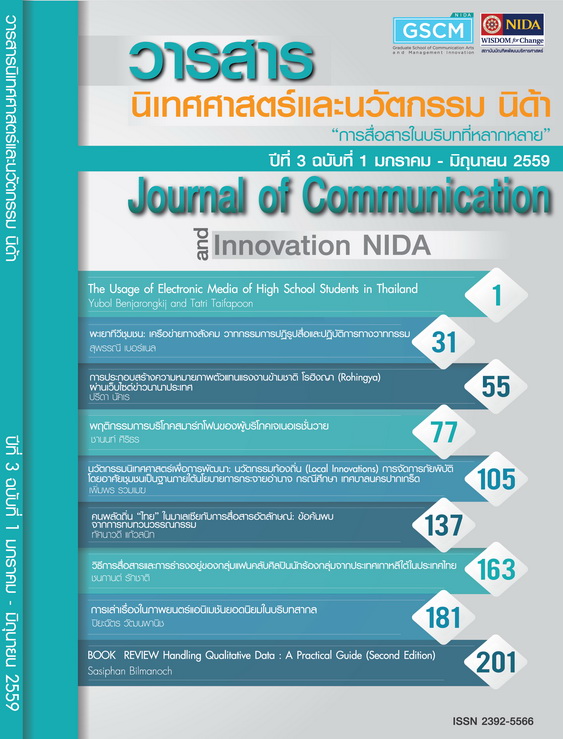คนพลัดถิ่น “ไทย” ในมาเลเซียกับการสื่อสารอัตลักษณ์: ข้อค้นพบจากการทบทวนวรรณกรรม
Main Article Content
Abstract
ประเทศมาเลเซีย เป็นหนึ่งในหลายประเทศของภูมิภาคเอเชียตะวันออกเฉียงใต้ที่มีความหลากหลายของกลุ่มชาติพันธุ์อย่างเด่นชัด ภายใต้การบูรณาการกลุ่มชาติพันธุ์ในรัฐพหุสังคมของรัฐชาติมาเลเซียเพื่อสร้างความเป็นเอกภาพ กลุ่มชาติพันธุ์ชาวมาเลเซียเชื้อชาติไทยเป็นชนกลุ่มหนึ่งที่ยังคงธำรงรากเหง้าวัฒนธรรมอันเป็นทั้งระบบคุณค่าและความหมายของกลุ่มชาติพันธุ์ไว้ ซึ่งท่ามกลางสภาพแวดล้อมและบริบทของวัฒนธรรมอื่น การสื่อสารอัตลักษณ์นับเป็นเครื่องมือสำคัญในการยึดโยงความสัมพันธ์ของกลุ่มชาติพันธุ์เพื่อธำรงรักษาอัตลักษณ์ทางวัฒนธรรมของชุมชน หรืออีกนัยหนึ่งคือเพื่อต่อรองอัตลักษณ์ของชาติพันธุ์ให้ทำหน้าที่นำมาซึ่งอำนาจในการต่อรองสิทธิอันพึงมีในฐานะพลเมืองของรัฐชาติ และเมื่ออัตลักษณ์เป็นสิ่งที่ถูกประกอบสร้างขึ้นที่ย่อมถูกรื้อสร้างขึ้นมาใหม่ได้ ด้วยเหตุนี้ อัตลักษณ์จึงมีลักษณะเลื่อนไหลไปมาตามแต่สถานการณ์หรือแล้วแต่ปริบท โดยในการประกอบสร้างอัตลักษณ์นั้น ก็จำเป็นต้องมีหน้าตักหรือฐานทุนที่เหมาะสม การดำรงอยู่ของชาติพันธุ์ชาวมาเลเซียเชื้อชาติไทยแต่ละรุ่นท่ามกลางช่วงเวลาของการเปลี่ยนผ่านของระบอบการเมืองการปกครองและสังคมวัฒนธรรมในแต่ละยุคสมัยย่อมสร้างความเปลี่ยนแปลงให้เกิดขึ้นกับศักยภาพการดำรงอยู่ วิถีชีวิตและอัตลักษณ์ชาติพันธุ์อย่างเป็นพลวัต ชาวมาเลเซียเชื้อชาติไทยจึงเลือกนำเสนออัตลักษณ์ชาติพันธุ์ในหลากหลายมิติผ่านกระบวนการเลือกสรรถ่ายทอดสืบต่อจากคนรุ่นสู่รุ่นเพื่อเป็นหลักประกันการดำรงอยู่อย่างมีอัตลักษณ์ศักดิ์ศรีของชาติพันธุ์
Malaysia is one of several countries of Southeast Asia which integrates a variety of ethnic groups into a multi-ethnic society to build unity of the state. Siamese-Malaysian ethnic minorities continue to uphold the fundamental cultural value system and meaning of the ethnic groups among environmental and other cultural contexts. Communicating identity is a key tool to create the relationships between the ethnic groups to preserve the cultural identity of the community. In other words, the power of collective bargaining rights, which everyone should have as citizens of the state, is required in order to negotiate ethnic identity. When identity is being built it needs to be deconstructed and then reconstructed. Because of this, the identity will have to be dynamic / shifting, depending on the situation or context. This identity needs capital which appropriate. The existence of ethnic Siamese-Malaysian for each generation in the period of transition to democratic politics, and culture of each period makes a change occur so as to have the potential to still exist in society. Culture and ethnic identity is dynamic. Ethnic Siamese-Malaysians chose the ethnic identity in various dimensions through the process of selecting a successor transmitted from generation to generation, so as to ensure the existence and identity of ethnic pride.
Article Details
ข้อความและความเห็นในวารสารนิเทศศาสตร์และนวัตกรรม นิด้า เป็นของผู้เขียนแต่ละท่าน มิใช่ของคณะนิเทศศาสตร์และนวัตกรรมการจัดการ สถาบันบัณฑิตพัฒนบริหารศาสตร์


